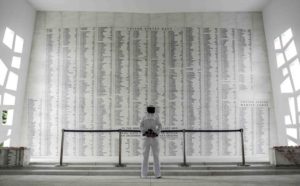 December 7, 2016, marked the seventh-fifth anniversary of the bombing of Pearl Harbor, an event that catapulted the United States into the fiercest armed conflict it has ever known. Termed “a day that will live in infamy” by then President Franklin Roosevelt, the scars of the war that began then remained fixed in the American psyche. Visible scars remain as well in places such as the underwater memorial created by the hulk of the battleship Arizona which has rested undisturbed in the waters of the lagoon where it was sunk all those years ago.
December 7, 2016, marked the seventh-fifth anniversary of the bombing of Pearl Harbor, an event that catapulted the United States into the fiercest armed conflict it has ever known. Termed “a day that will live in infamy” by then President Franklin Roosevelt, the scars of the war that began then remained fixed in the American psyche. Visible scars remain as well in places such as the underwater memorial created by the hulk of the battleship Arizona which has rested undisturbed in the waters of the lagoon where it was sunk all those years ago.
And while that day remains infamous, all that associated with it has taken on a complex texture since. Time and events in many instances have muted in unexpected ways.
Personal Perspectives
This anniversary brought forward much recounting and recollection, from painful to poignant, from dismaying to triumphant. As part of the acknowledgment of the occasion, the media offered documentaries that included newsreels of then-young soldiers and sailors, mostly men as consistent with the nature of the times, juxtaposed alongside contemporary interviews with some of the few living survivors of that day.
One such presentation included a retrospective of a twenty-something-year-old sailor who met the day a hero, and as a consequence lost his life. His family had preserved his memory all the years since. His story was still enshrined within a third generation, reverently held in trust for seven and one half decades, and even now by ones who never knew him personally. The dreams and hopes he once held for his unfolding life are thus still present to behold by virtue of the tenderness with which his letters, photographs, anecdotes about him, and even his home made films from Hawaii, have been preserved and passed down.
Another episode featured a man ninety-one who was present and survived the day, albeit wounded and scarred. In the company of his wife, with others nearby to document the moment, he journeyed from shore to the memorial canopy erected over the hulk of the USS Arizona, there to be publicly acknowledged. At the end of that occasion, this man made his way feebly yet unhaltingly to the wall where the names of all those who died with the ship are engraved. As he stood there, reverence could be seen in his body as his nearly inaudible voice seemed to speak to persons unseen by other observers. An image of a vibrant, glowing youth seemed to rise out of him even as he stood there, hunched over on part-bended, near-now-ancient knee.
This great span of years later, enemies have become allies, with Tokyo and Washington making common cause in a world defined by stresses and adversaries much changed from 1941. Individual combatants have become comrades, as attested by the documented stories of Japanese and American fighters meeting as aged civilians and finding their way to reconciliation.
The stage for World War II was cosmic. Indeed it is the nature of sweeping conflict to be engulfing. Still, even as the tale is writ large, the measure of what it all means lies in the ways individual lives are affected by ongoing events, as the instances of the two men cited above attest.
“They Were Expendable”
One of a multitude of films to be set against the grand backdrop of World War II was “They Were Expendable.” A fictionalized story based upon actual circumstances and people, it tells the tale of a torpedo boat squadron stationed in the Philippines at the onset of hostilities. Facing overwhelming odds, the group nonetheless “took the fight to the enemy” and accounted themselves well in terms of warfare, inflicting damage to greater measure than their resources would seem to support. Over time, however, the weighted odds prevailed and their numbers and materiel diminished and eventually the squadron dissipated to nothing, partly through death and partly through fatigue.
It is a presumption of warfare that all can be sacrificed in the struggle to prevail. In war it is permissible to offer up every resource, including that of human life, in pursuit of “winning.” That was the plot of the aforementioned movie, foreshadowed by the use of the word “expendable” in the title.
Now, some seventy-five years beyond the fitful unleashing of the unmeasurably ferocity that was World War II, what stands forward most of all are the quiet utterances and reverential attitudes of men and women in their eighties and nineties and even hundreds who bear solemn witness to a time of madness. They fulfill dual roles, standing like sentinels alongside the never realized promises of the many eclipsed lives tapped from among both the “winners” and the “losers.” The youth of seventy-five years ago would themselves today be old, and perhaps even passed on, but it remains a somber thought to realize they never had the opportunity to come to death naturally, nor fill all the intervening lost years with the fullness of family and vocation and commerce.
The cost of strife is immense. Of this we were reminded as a nation on December 7.
A Place for Peace
 Even as we can soberly reflect upon a time when it was otherwise, peace now lies upon our land and we can live our lives unhindered. We can shortly celebrate another anniversary, the arrival of one known as the Prince of Peace, with joyful and not despondent spirits such as were spread those across the land in 1941 and the several years to follow.
Even as we can soberly reflect upon a time when it was otherwise, peace now lies upon our land and we can live our lives unhindered. We can shortly celebrate another anniversary, the arrival of one known as the Prince of Peace, with joyful and not despondent spirits such as were spread those across the land in 1941 and the several years to follow.
Even as we approach the great day of Christmas, we are called as faithful people to reserve a place within our hearts for those who struggle to survive in war-torn places like Syria and swaths of the Middle East, or South Sudan, or those consigned to live as refugees or wanderers across the face of the earth, or indeed even those who dwell in strife filled places within our own nation’s towns and neighborhoods, understanding that they experience December 7 and every day, not as an anniversary but as an ever-present reality of their lives.
We are called as faithful people to commit ourselves to the notion that there shall be no more victims born of violence perpetrated by one human being against another. We are beckoned as Christians to help usher in true “tidings of great joy” for all people everywhere, and to work to bring about that day when all people might live out their hopes and dreams over a full span of years, and not have them foreshortened by “cosmic clashes” that would see human lives as expendable.

